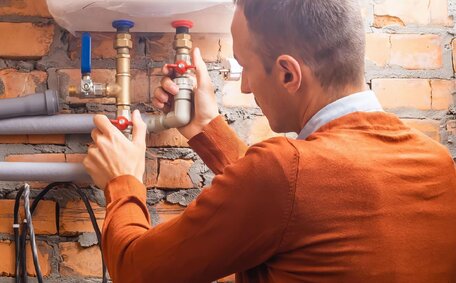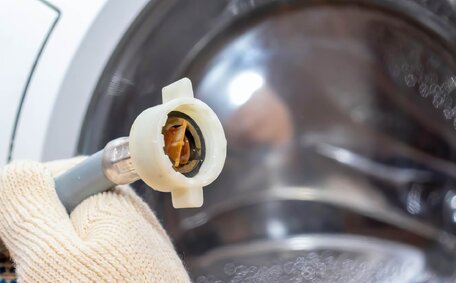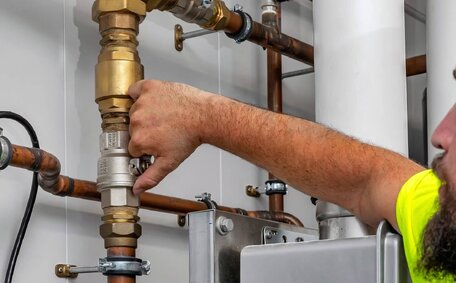Introduction to Brown Hot Water
Encountering brown water from your cold or hot taps may be unexpected, yet it is a common problem for Saint Marys residents. As experienced Sydney plumbers, we provide advice to help ensure the water from your faucets is clear and of good quality.
Discolored hot water, which may seem unsettling, is often the aftermath of sediment buildup from substances such as iron and manganese, and corroding pipes that influence brown water your tap dispenses, but water can also reveal much about your system’s health. Rust and deposits like iron and manganese can result in discolouration, causing water from your taps and water heater to appear brown.
While it may look concerning, brown tap water is usually still safe for consumption. Throughout this article, we’ll delve into the reasons why your water appears discoloured and offer strategies to rectify the issue.
Contact our Saint Marys plumbing team for assistance in maintaining pristine, untainted water in your home. Call or email us for an assessment of your hot water fixtures and to restore clear water throughout your property.
What Causes Brown Water from Taps?
Recognising the common causes of brown tap water is vital, as they typically link to these universal issues:
Sediment Buildup
Sediment from minerals like iron, manganese and calcium can accumulate in your water pipes over time, causing brown discolouration in your hot water system. As water moves through the system, it gathers sediment that, at times, can affect the hot water coming out your taps, turning it brown in appearance.
Corrosion and Rust
Corrosion from the inside of pipes releases iron particles into your water supply, leading to brown discoloration if deterioration is present. Concerningly, dirty water from hot taps may indicate more extensive issues since hot water accelerates the process of corrosion.
Disturbances in the Main Water Supply
Sometimes, disruptions like nearby roadworks can momentarily usher in brown municipal water direct from the water main into your home’s faucets, affecting the brown water in your cold stream. Run your cold tap first, then switch to hot to check for improved clarity, which could suggest sediment as a culprit for the opacity. If both hot and cold water remain brown, it’s important to investigate potential issues within your plumbing system.
Old Water Heater
Sediment buildup and corrosion can pave the way into your hot water heater, especially as it ages, making the water turn brown. As the water heats, rust, scale, and sediment find their way into the mix, causing continuous discoloration—this signals issues, especially where hot water is concerned and you find brown water coming your way.
If flushing your system doesn’t resolve the issue, it’s time to consider professional help. You may need to call a professional plumber for an in-depth resolution. They can examine your pipes and water heater, diagnose the problem can suggest necessary repairs or parts replacement to re-establish pure water flow.
Is Brown Water Dangerous?
Rusty brown water emerging from your taps can naturally cause health concerns. In most cases, water flowing through taps that is safe to drink should not pose a danger or hazard to your health, even if brown.
Although discoloration at your brown water tap may appear concerning, understanding the causes of brown tap water is crucial, as if it’s primarily caused by common plumbing issues, the water remains safe for consumption. That said, on-going brown water indicates your plumbing system needs attention.
Should the problem arise abruptly, or you draw water only from a private bore, dirty tap water ought to be examined for coliform bacteria, because such discoloration can at times be a red flag for water quality concerns. Contact your local team - as your Saint Marys plumber, we’re equipped to assess your water’s safety.
Persistent discoloration can pose a challenge, making you ponder if the water still qualifies as safe when the hue from your taps remains unchanging. To be certain your drinking water is clean and clear long-term, a plumber should inspect your pipes and water heater.
At Saint Marys Plumbing, our expertise enables us to address the root of your brown water concerns effectively. Reach out and we can thoroughly assess your plumbing system, confirm the water’s safety, and take steps to restore full water clarity in your home.
How to Address Brown Hot Water
If you’re encountering brown water in your hot tap, here are some strategies:
Flush the Water Heater
To flush:
- Turn off the hot water heater and let it cool for a few minutes
- Connect a garden hose to your water heater’s drain valve, leading to a safe drainage area, and allow several hours for draining.
- Open the valve, let the water drain until it runs clear, then refill the tank before restarting the heater.
- Make sure to close the valve and refill the tank before turning the heater back on
Check/Replace the Anode Rod
The anode rod captures minerals like iron and manganese, preventing them from damaging the tank. Over time it gets coated in sediment and can be a source of discoloured water within your plumbing system. Regular inspections and timely replacement of the anode rod can reduce the occurrence of discolouration.
Consider Replacing Old Pipes
If you have old iron, galvanised steel or lead pipes, corrosion and sediment buildup can integrate into water supply, leading to persistent concerns. Replacing problem pipes with new copper or PEX lines can provide a long-term solution.
Contact us with your details, and we’ll ensure your taps deliver clean water again.
Our Sydney-based plumbing specialists can examine your plumbing system thoroughly, identify discoloration causes, and ensure restoration of clean, clear water in your home.
Preventing Recurring Brown Water
To prevent ongoing issues with brown water, it’s important to perform regular maintenance and get your plumbing system inspected by a professional.
Regular Maintenance
- Flushing your hot water system annually is an effective preventative measure against brown tap water.
- Replacing the anode rod in your hot water system every 3-5 years
- Checking pipes and fittings for corrosion and replacing old iron or galvanised pipes
It’s also a good idea to have your water quality tested annually if you’re on a private well.
Professional Inspections
For a thorough check of your entire plumbing system, a licenced plumber can:
- Inspect all water supply pipes and fittings
- Assess the water heater and flush if needed
- Check pipe integrity and look for leaks
- Test water quality and purity
Call us at 1300 349 338 to arrange a detailed inspection. This can identify and resolve any issues to keep your hot water running clean safe and prevent ongoing problems.
With regular plumbing maintenance and our professional services, you can enjoy dependable, clear hot water long into the future.
When to Call a Professional Plumber
Although some cases of discolored water can be managed with DIY approaches, certain situations require a professional plumber’s expertise.
It’s wise to call a professional plumber if:
- Brown water persists despite flushing the water heater and replacing the anode rod
- The issue started suddenly or happens sporadically
- Water pressure seems lower than normal
- You have very old iron, galvanised or lead pipes in your home
- There are unexplained leaks, damp spots or signs of corrosion
- Your water smells foul or chemical-like
- You’re on well water and notice a change in clarity or colour
Plumbers, with their comprehensive training and specialised tools, can effectively address and resolve persistent water discoloration and contamination. They can also check for hidden pipe damage that may go unnoticed otherwise.
For assured water quality and plumbing reliability, trust the licensed experts at Saint Marys Plumbing. Call us at 1300 349 338 to arrange a detailed inspection.






